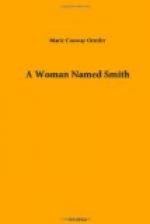“Freeman was not a crook; his face is hard, stern, bigoted, secretive, but honest. Yet if he didn’t do it himself what was he trying to tell when death cut off his wind? If he did it, where did he hide the plunder? Here in this house? His family must have known every nook and cranny as well as he did himself, and he could be sure they’d pull it to pieces in the search that would ensue.
“If Richard were the thief, to whom did he give the loot? If the gems had been put upon the market, some trace of them must have been discovered. Remains: Who got them? Where did they go?”
“That’s what the unhappy people in this house asked a century ago, and there was no answer,” I remarked, soberly.
“And that poor woman Jessamine went mad trying to solve it!” he said, looking at her with commiseration. And after a pause: “And so the lady who left her husband’s grandniece the house of her forebears was Freeman’s daughter: and the Austrian doctor’s son is Richard’s great-great-grandson! I meet Jelnik pere in Vienna, and come to Hyndsville, South Carolina, to meet Jelnik fils. H’m! Decidedly, the situation has nice possibilities!”
Whereupon he took note-book and fountain-pen from his coat pocket and in the most composed manner began to jot down the outstanding features of Hynds House history.
“It will give me something to puzzle over while I’m here,” he remarked, complacently. It did!
The Author approved of Hynds House. It had all the charm of a new and quaint field of exploration and research, and there was nothing in it to offend his hypercritical judgment. I have a shrewd suspicion that Mary Magdalen’s cooking played no mean part in his satisfaction. His prowess as a trencherman aroused the admiration and respect of Fernolia, who waited on table. Fernolia had learned to admire herself in her smart apron and cap, and to serve creditably enough. Only twice did she fall from grace; once was the morning The Author broke his own record for waffles. Fernolia, excited and astonished, placed the last platter before him, raised the cover with a flourish, and remarked with deep meaning:
“Dem’s all!”
The second time was when we had what Mary Magdalen calls “mulatto rice,” which is a dish built upon a firm foundation of small strips of bacon, onion, stewed tomatoes, and rice, and a later and last addition of deliciously browned country sausages. Fernolia, beaming upon The Author hospitably, broke her parole:
“You ain’t called to skimp yo’self none on dat rice,” she told him confidentially. “De cook done put yo’ name in de pot big. She say she glad we-all got man in de house to ’preciate vittles. Yes-suh, Ma’y Magdalen aim to make you bust yo’ buttonholes whilst you hab de chanst.”
I am told that The Author always makes a great hit when he tells that on himself, and is considered tremendously clever because he can imitate Fernolia’s soft South Carolina drawl.




